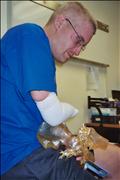Jason Speaks in "The Washington Post"
Like the Nation, Military Families Divided on
Loved Ones Remain Resolute or Doubtful In Aftermath of Study Group's Report
By Christian Davenport and Joshua Partlow
Sunday, December 10, 2006; A03
Nancy Hecker hasn't read the Iraq Study Group's report. She doesn't need to. She knows her son, Army Maj. William F. Hecker III, died at 37 for a just cause, no matter what the antiwar crowd thinks.
If she "can stand firm in support of our country and the mission, is it too much to ask the rest of the country to do so as well?" she asked.
Beverly Fabri also doesn't need the report to help her make up her mind on
Almost three years after her 19-year-old son, Army Pvt. Bryan Nicholas Spry, was killed, she said: "I'm beginning to feel like he just died in vain, I really am."
As the country debates what's next for
When the war began nearly four years ago, there was virtually unanimous support for it among military families. But as the country's belief in it has deteriorated, cracks have also begun to show among those who were its staunchest backers. And now, as the death toll mounts, many are struggling to reconcile bad news that seems to keep getting worse with the mission their loved ones believed in and died fighting for.
In Kathy Petty's opinion, the report "is not going to change much." But she's not clear about what should be done in the war that claimed her son, Army Capt. Christopher P. Petty, 33.
On the one hand: "I want the Iraqi people to be free. I want them to have their democracy. That's what Chris died fighting for."
On the other: "You've got almost a civil war. . . . And I'm not sure what we could do better. I'm not sure sending more troops would work."
Her son believed in what he was doing there. She remembers how he talked about building schools for Iraqis, and how the soldiers were treated like heroes by the townspeople.
That's why Petty, of
"I do want Chris's death to have been meaningful, but I don't know," she said. "It's very hard to see a light at the end of the tunnel, if you know what I mean. It just seems to keep getting worse."
On Wednesday, the day the Iraq Study Group report was released, at least 11
A poll conducted last week by the Associated Press found that 63 percent of respondents did not expect a stable, democratic government to take root in
All the talk of changing course in
"I don't want him to have died for nothing," said Fry, who has three young children and lives near
Marine Lance Cpl. Eric W. Herzberg's faith in the war, like that of much of the country, waned as the conflict dragged on, said his mother, Gina Barnhurst. But when his unit was called, Herzberg, 20, of
And that's why she believes political leaders should think about the death of her son -- and the deaths of others -- as they decide what to do next in
It has been nearly a year since Hecker's son, a West Point graduate and father of four, was killed south of
Hecker, of
"If we had all stood firm on this, it would have sent a message to the terrorists," she said. "The more divided that we were, the more opportunity they saw to be successful by destroying our national will."
What Hecker sees as harmful dissent, Yvonne Green of
"They still aren't bringing the troops home immediately," she said. "If you're going to pull them out, do it immediately."
Still, the report boosted her belief that
Now she wonders how the debate at home affects the soldiers who served with her daughter -- Army Spec. Toccara R. Green, 23, who was killed last year -- and the other service members still in
"I really feel bad for the troops, because it's like they are constantly getting told mixed messages," she said. "They are being told different things all the time. They don't know. Are we leaving? Are we staying?"
Command Sgt. Major Jeff Krausse, 51, of the Washington National Guard, said the country never should have invaded
Asked about the war, Krausse said: "First of all, I believe that we were lied to." He denounced the "propaganda" about weapons of mass destruction that justified the invasion and described the war now as a "no-win situation" that is "costing the taxpayers billions of dollars."
Still, he said, he'd go back if called.
"Unfortunately, now that we're there, we've got to finish what we've started," Krausse said from his home in
Jason Scott also has a big stake in how the war turns out. He lost an arm and an eye there and spent more than a year recovering at
"Public opinion has become so negative," he said. "So rather than make the hard decision to continue on to do the hard work to fix the situation, we're going to cut out and take the easy path."
If that happened, it would undercut the sacrifices so many soldiers made, he said. But it wouldn't diminish their service.
"That legacy of us being professional soldiers who answered the call can't be taken away from us no matter what happens," said Scott, 29, who now lives in
David Hartman's daughter, Army Sgt. Jennifer M. Hartman, 21, died in September. Since then her father, of New Ringgold,
He hadn't hard much about the Iraq Study Group or read its report. And he doesn't much care what it said about the future of
"It's not going to bring her back."
News researchers Meg Smith and Magda Jean-Louis contributed to this report.

